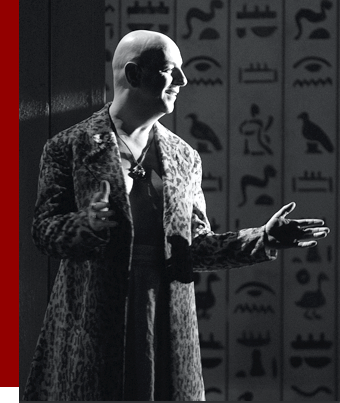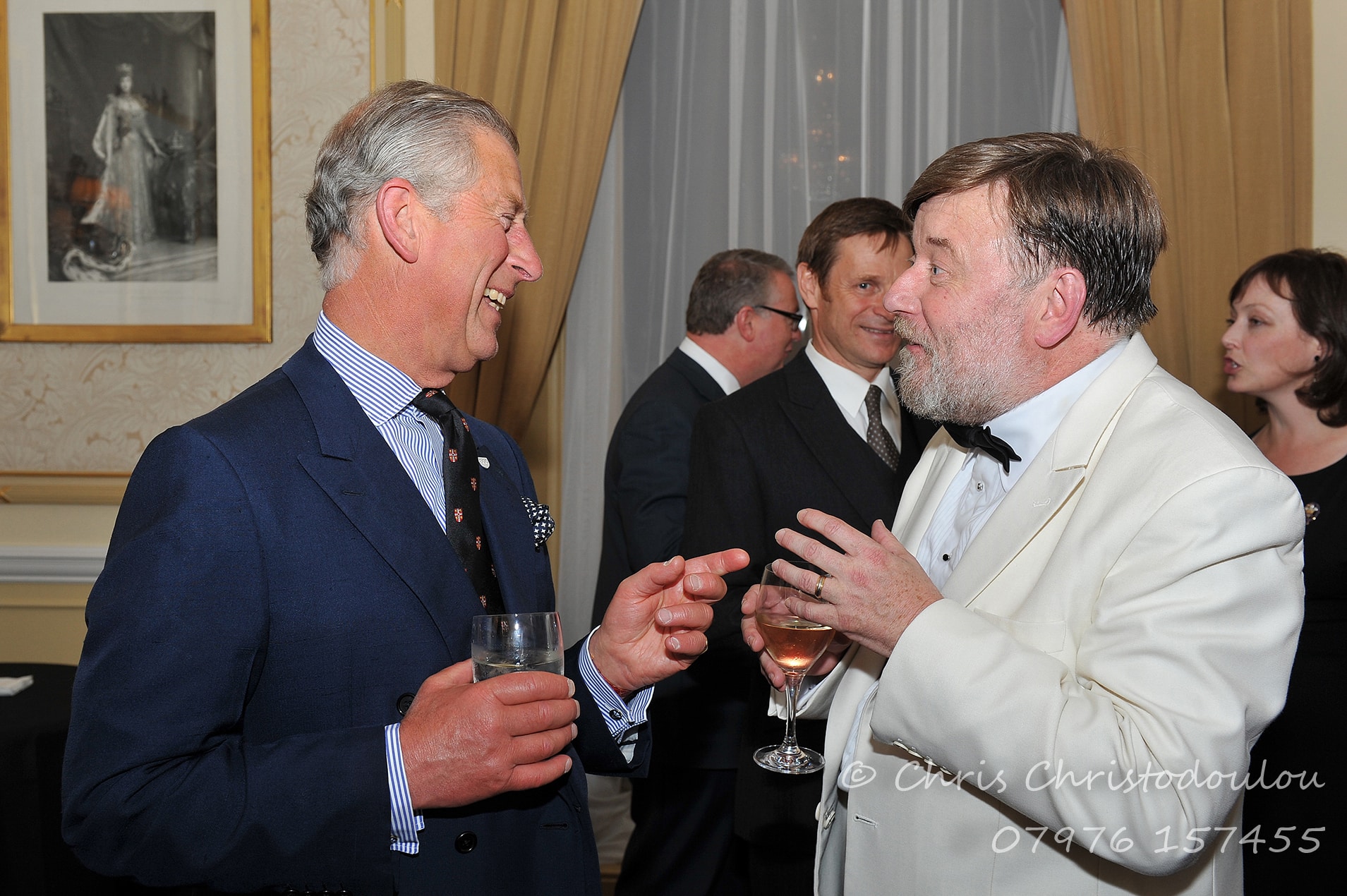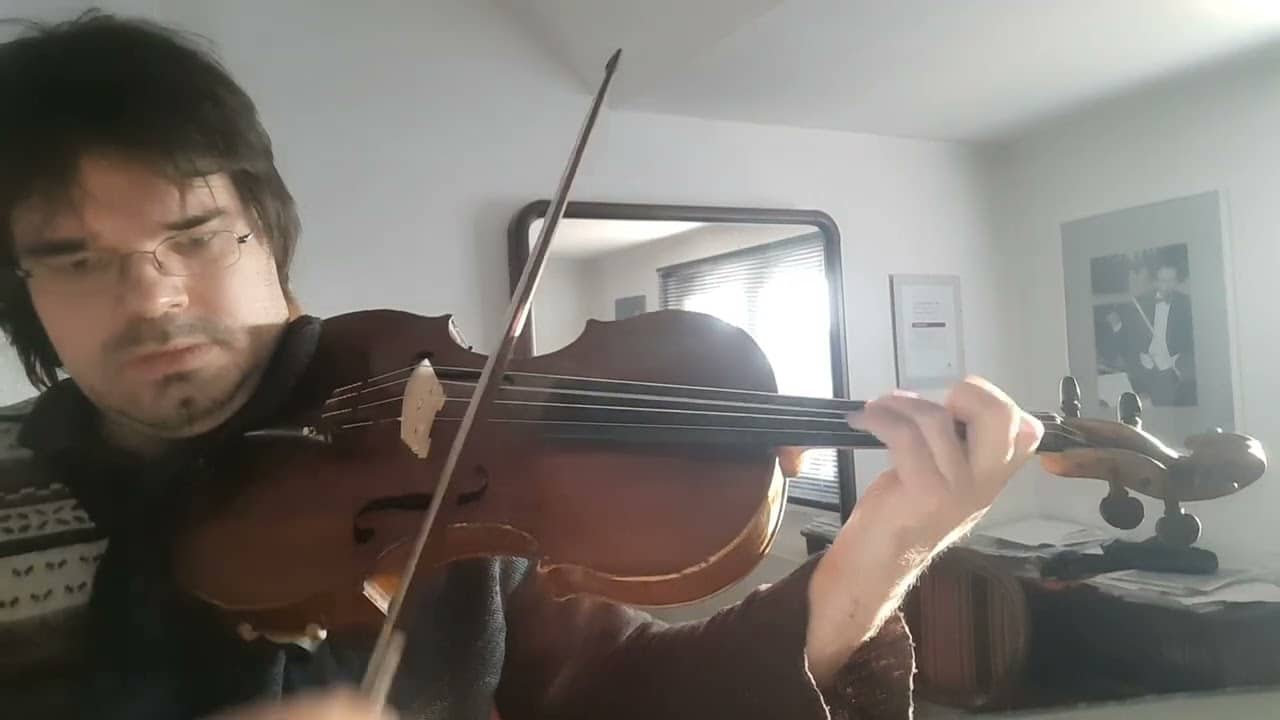How Glenn Gould got split in two
mainChristopher Robson has kindly sent me the story behind his involvement in the upcoming Munich premiere of Glenn Gould vs Glenn Gould.
The Swiss pianist and actor Danny Exnar plays Gould. Apparently, there’s a walk-on part for Barbra Streisand.
I think I need to see this show.
Here’s Christopher’s text:
1 Glenn Gould project background In the July of 2007 the stage director Gert Pfafferodt approached me with a view to taking part in a project. He and the actor Danny Exnar had come to hear me at the in Munich a few weeks earlier, where I had put on my own show of readings and songs (Sonnets by Shakespeare & Donne, interspersed with songs by their contemporaries) called “Sonnets to Sundry Notes of Music” (after one of the set of sonnets by Shakespeare). Gert was already very familiar with my work through my already 15-year association with the Bayerische Staatsoper, and had seen me perform on stage many times. However, for some reason this evening of readings helped him to make up his mind about asking me to join his Glenn Gould project.
Gert Pfafferodt and the actor Danny Exnar had been working on the
idea of a Glenn Gould show for 9 months or so by the time I met
them. Danny was born near Basel in Switzerland, and had studied piano from a young age. After leaving music school in Basel he studied a further year in Prague, principally to hone his jazz piano skills; he then returned to Switzerland – to Berne this time – to take a degree in Philosophy. Finally, he went on to study drama at the renowned “Otto Falkenberg Schule”, the drama school associated with the Kammerspiel Theater in Munich. There he met Gert Pfafferodt who, as principal professor at the school, became his mentor. After 3 years, Danny graduated in 2006 and took up a “fest” contract with the Landestheater in Tübingen. Danny left the ensemble at the end of 2010 and is now a busy freelance actor. It was then that Danny and Gert began to put together the Gould project, gleaning texts Gould’s diaries and writings, as well as his TV and film interviews.

The work in progress that I saw at Gert Pfafferodt’s studio in July of 2007 was an almost finished play in German, lasting about 45-50 minutes. Danny played Glenn Gould speaking about his childhood, Bach, music performance etc; and at one point, with the aid of finger puppets, Danny interviewed Gould through imitations of various well known German/Austrian/Swiss TV and radio Arts & Culture personalities. Danny also played excerpts on the piano of music by Bach, Gibbons and Wagner, showing what a consummate musician he was as well as being a fine actor. 2 After this showing, over wine and lunch they explained to me how they would like me to join the project and how I could fit in to it. Their initial desire was - considering his love of Wagner, the fact that Gould transcribed some of Wagner’s music for the piano, his love of the human voice, and his lifelong habit of singing with the music he played - that I should appear towards the end of the play and sing sitting at the piano (with Gould at my feet) the “Liebestod” (unaccompanied) from Wagner’s “Tristan und Isolde”. A sort of “apotheosis”.
I immediately agreed to join the project. This was something different for me, and having just moved to live in Munich I knew that I would have time and space to work on such an interesting idea. Over the next 18 months my role slowly evolved from being just a singer appearing at the end of the play, into an actor who would be on stage with Danny from the very beginning. My role had become almost catalytic and somewhat enigmatic. The play would begin with Danny on the floor of the stage kneeling by a large tin bath filled with water, making paper boats and setting fire to them as they floated on the water’s surface. I would appear and sing an old American evangelical carol. This beginning meant to reflect Gould’s Presbyterian upbringing and the possibly repressed childhood. I would sit to one side of the stage by a table with my script/music/books etc. At a certain point in Danny’s story I would read some text from one of Gould’s letters to his parents, and supplement it with a short analysis from one of Gould’s biographers. One episode to evolve through various bits of research, discussion and improvisation was the “Barbara Streisand moment”. Glenn Gould became a big fan of Barbara Streisand when she burst on to the theatre and music scene in the early 1960s. It is possible that he actually fell in love with her, but he was certainly infatuated with her. Some years later, on hearing she was in a nearby studio one day while recording, he tried to go and introduce himself to her to express his admiration for her. Unfortunately, the studio “red light” was on and he was unable to interrupt the recording session. Consequently, he returned to his own studio. 3 Apparently, Streisand got wind of his intention and took it upon herself to go and see him herself. Upon entering his studio she expressed her admiration for him and his artistry, saying she was one of his biggest fans, and offered her hand to him with “Oh by the way, I’m Barbara Streisand!”, to which Gould responded after a few seconds with the curt repost; “I know!!”. She left the room in some confusion, and the two of them never met again.

This incident is re-enacted repeatedly in the show, until it finally breaks out into a performance of the standard crooner song “Cry me a River”. It is pure speculation as to whether they might ever have made music together – Gould did openly express his admiration and desire to do some sort of work with her - but somehow the text of the song and the idea of them meeting with such a disastrous outcome highlights the complexities of Gould’s personality in the context of the play. It is a bittersweet moment, and somewhat flamboyant.

In January of 2009, we finally took our “work in progress” public with a performance in the studio space of the Landestheater in Tübingen. There was no stage set, no design as such, just a bare stage with a piano, a couple of chairs and a small table, and the tin bath. The studio space officially seated 150, but it was in fact oversold and people were being turned away at the door on the night. The reaction was incredibly positive and we could see we were hitting a nerve with the audience.
It became clear however that there was a hole in the piece, and that the jump from the Streisand moment to the beginning of the Wagner moment, and Gould’s apotheosis, needed to filled out somehow. The next few meetings and workshops tried to resolve that with the inclusion of T.S.Eliot’s “The Love Song of Alfred J Prufrock”, which I would read complete and in English. Eliot was one of Gould’s two favourite writers (the other being Christopher Fry), and the poem readily mirrors Gould’s confusion and inhibitions in regards to the opposite sex and his difficulty in expressing intimate feelings. We also experimented with the idea of bringing someone – a woman – up from the audience and dressing her in a shimmering gown and standing her on a pedestal during the reading. I was never actually quite sure what it meant, but it was an arresting visual image. 4 By this stage Gert had invited the well-known German painter and sculptor Bernd Zimmer to collaborate with us. He designed and built a giant Mobile, which hangs in space over the concert grand piano and most of the stage, and painted a massive “Cosmos” (6 metres high by 2 metres wide) which stands or hangs at the back of the stage. These were ready in time for the next performance in Tübingen in June of 2009, this time on the main stage of the 500- seat theatre.

Another hurdle fell at this point when permission and rights were secured from the Glenn Gould Estate and Gould’s publishers to use the texts that made up the bulk of the play. Although there are some improvised lines and some text that are written/invented for dramatic clarity, the vast majority of the texts are Glenn Gould’s own words, albeit translated into German by the German publisher Piper Verlag. In the last year we have slowly worked through and tried to fine tune what we had produced, and introduce one more element: a visitation – albeit very briefly – by J.S.Bach. At first I was a little sceptical of introducing such an obvious figure into the play, particularly as he is well represented musically. But as the appearance is very brief and somewhat humorous it seems to work. Some audience members may not even perceive the character as Bach, but maybe as just another strange element in our slightly quirky exploration of GG.

The show we will premiere in the Carl-Orff-Saal the Gasteig in Munich in October will now last 1 hour 30 minutes or so. Throughout the piece there is a feeling of character flux, a deliberate stance to leave the characters loosely defined. There is a fluctuating uncertainty as to whether the actors are playing specific characters at any given moment or not; this in a way reflects the uncertainty of Gould as a public figure, sort of helping to highlight the various enigmatic qualities of Gould. It is fair to say that, despite the number of books and articles written about and analysing Glenn Gould, there is still so much of the man that remains a mystery. Perhaps this is a major reason why he became the Icon which he still remains today.
5
Where do we go from here? Gert Pfafferodt’s wife, Antoinette Cherbuliez, has now set up a production company called “Cherbuliez Productions” to deal specifically with the Glenn Gould project. She is actively seeking sponsorship and dealing with issues of Rights, etc. The agent & producer Thomas Petz (who produced and toured many of Peter Brook’s productions back in the 80’s & 90’s), is now on board with us, looking at festivals and guest theatre appearances in the German speaking world through 2012. We now also have an English Language version of the play. Danny Exnar spent 3 months last year in New York, working intensively with Wendy Waterman at the Julliard and actor Ben Rappaport, to try and develop a more idiomatic accent to his already fluent English. An English language version immediately opens up the possibility of a wider audience, and we are hoping that this side of the project will prove fruitful in the coming year. Most importantly, the development of the piece is seemingly complete. Our original working title was: „Annäherung an Glenn Gould über Glenn Gould“ or “Approaching Glenn Gould through Glenn Gould” For the Gasteig premiere this has now been changed to: “GLENN GOULD vs GLENN GOULD” Christopher Robson Munich, October 2011






Thanks Norman for posting this. I’m not quite sure, however, how relevant the photograph of Julia Gooding and Michael George singing in a performance of Purcell’s “Dido & Aeneas” might be. But nice to see such an angry Dido 🙂
oops, sorry Chris. duly replaced.
Thank you, Norman, thank you, Chris! What a lovely description of the history of our play.
As an actor, what can I say? It’s the most wonderful thing to channel and work on a character such as Glenn Gould for more than 4 years. Trying to approach Glenn Gould. The more we plunged into his world and his thoughts, the more open questions we had. During rehearsals, we were never trying to “explain” Glenn Gould or to reveal unrevealed “truths” about his life. We leave this to the biographers. But we had to get as close as we could to his inner motivations, his longings, his passion in order to showcase him with all the respect he deserves. A most challenging thing to do with such a complex and often contradictive character.
Glenn Gould has been a vast traveling companion of mine for years. My “coming of age” music was Glenn Gould’s interpretation of Bach. I have to confess that I started, as most pianists do at some point, to try to imitate Glenn Gould’s playing when I was around 16 or 17. When I started studying at the conservatory “Jaroslav Jezek” in Prague, my professor instantly realized that and said that I am not the first one to try this and that I could pack my stuff and leave if I continued to imitate Gould. “Yes, Glenn Gould was a genius”, he said, “but only Glenn Gould can play as Glenn Gould.”
I guess I’ve learned my lesson.. But at drama school, it hit my mind again: “Well, I can’t imitate Glenn Gould’s playing as myself. But since I am about to become an actor, I have the opportunity to become Glenn Gould for a while, and, well, I should at least be allowed to imitate his playing when I am playing Glenn Gould..” I met Gert Pfafferodt and the rest is history (see above)…
Glenn Gould once said: “I was never prepared to enjoy the presence of the audience.”
What we are doing in our show is Glenn Gould’s greatest horror (or greatest wish): We are actually being close to an audience. And we do enjoy it!
Greetings from Switzerland and see you in Munich!
Danny